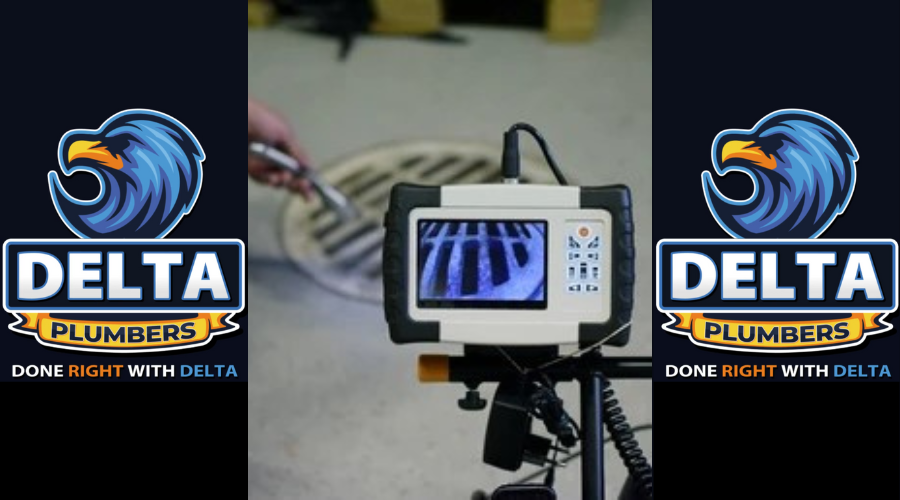The world of home technology is constantly evolving, and plumbing is playing an increasingly vital role in creating smarter, more efficient homes. As homes become more automated, the plumbing industry is also adapting to integrate technology in ways that improve convenience, energy efficiency, and safety. This blog explores the role of plumbing in smart homes, breaking down its importance and the innovations that are shaping the future of the industry.

Picture Source – Delta Plumbers
What is Smart Home Plumbing?
Smart home plumbing refers to the integration of advanced technology into traditional plumbing systems, allowing homeowners to monitor, control, and optimize water usage through connected devices. These systems are designed to increase efficiency, prevent leaks, and provide real-time updates on water consumption. A variety of products fall under the umbrella of smart home plumbing, including water sensors, smart faucets, leak detectors, automated water shut-off valves, and Wi-Fi-enabled water heaters.
In a smart home, plumbing goes beyond pipes and drains—it integrates with the home’s central automation system. This means you can control water flow with your smartphone, receive alerts if there’s a leak, or even adjust your water heater settings remotely to save energy.
For example, a smart showerhead can control water temperature and pressure through an app, allowing users to create personalized shower experiences. Similarly, leak detectors can notify homeowners of water leaks immediately, helping to prevent water damage before it escalates. Smart home plumbing systems contribute to a sustainable lifestyle by reducing water waste, energy consumption, and long-term costs.
Also Read: Benefits of Installing a Water Softener

Picture Source – Delta Plumbers
What is the Role of the Plumbing System?
The plumbing system plays a fundamental role in ensuring the functionality and safety of any home. Traditionally, plumbing systems have been responsible for transporting water for daily activities such as cooking, bathing, cleaning, and heating. Additionally, plumbing is essential for removing wastewater and maintaining sanitation within the home.
In a smart home, the role of the plumbing system expands to include automation and data-driven insights. The primary functions remain the same, but technology allows for greater control, accuracy, and efficiency. Smart plumbing systems can track water consumption, identify leaks in real time, and adjust water usage based on the household’s needs.
Plumbing ensures that water is delivered where and when it is needed while safely removing waste. As technology becomes a bigger part of everyday life, plumbing systems now contribute to water conservation, provide energy savings, and enhance the user experience through smart features that integrate with the home automation network.
For instance, smart irrigation systems can monitor weather conditions and soil moisture levels, automatically adjusting the water supply to avoid overwatering. Similarly, smart toilets equipped with motion sensors can control water flow and detect potential leaks, ensuring that plumbing systems remain efficient and environmentally friendly.
Also Read: How to Install New Kitchen Faucet: Delta Plumbers

Picture Source – Delta Plumbers
Why is Plumbing Essential for Home Building?
Plumbing is one of the most essential elements in home building, as it provides water for drinking, cooking, cleaning, and sanitation. Without a well-functioning plumbing system, homes would not be able to support these basic daily functions. In addition to making life convenient, plumbing systems are critical to maintaining health and safety in a home. They ensure that clean water is readily available, and waste is effectively removed, reducing the risk of contamination and disease.
During the construction of a new home, plumbing is an integral part of the planning process. Plumbing layouts must be carefully designed to ensure that water and waste can flow efficiently. The installation of pipes, fixtures, and water systems must be done with precision to prevent future problems, such as leaks or inefficient water flow.
In the context of smart homes, plumbing is even more essential. Builders now have to consider the integration of smart devices into the plumbing system, such as leak detectors, automated shut-off valves, and smart water heaters. These technologies can be seamlessly incorporated into the overall design of the home to enhance functionality and improve sustainability.
Plumbing is also essential in-home renovations, particularly when upgrading to smart systems. Retrofitting existing homes with smart plumbing devices ensures that they remain up-to-date with the latest technology and meet modern standards of efficiency and safety.
Also Read: Advantages of Using PEX Piping in Plumbing

Picture Source – Delta Plumbers
How is Technology Used in Plumbing?
Technology has dramatically changed the plumbing industry in recent years, making it more efficient, eco-friendly, and responsive to the needs of homeowners. Here are some of the most notable ways technology is being used in plumbing today:
- Smart Water Heaters: Wi-Fi-enabled water heaters allow homeowners to adjust water temperatures, monitor energy usage, and receive alerts for maintenance needs. These systems can be controlled remotely through apps, providing greater flexibility and energy savings.
- Leak Detection Systems: One of the biggest advancements in plumbing technology is the use of smart leak detectors. These devices can detect water leaks in real time and automatically shut off the water supply to prevent damage. Some systems even provide alerts through smartphone apps, ensuring that homeowners are notified instantly.
- Automated Shut-Off Valves: These valves can be installed in the plumbing system to automatically turn off the water when a leak is detected. This can save homeowners thousands of dollars in potential water damage repair costs and reduce water waste.
- Smart Faucets and Showerheads: These fixtures allow users to control water flow and temperature through apps or voice commands. They can also track water usage, helping homeowners reduce their water consumption.
- Water-Efficient Toilets: Smart toilets are equipped with sensors and automated features that improve water efficiency. For example, dual-flush systems allow users to choose between a low-flow or high-flow flush, depending on the need.
- Greywater Recycling Systems: These systems collect and treat water from sinks, showers, and washing machines, making it reusable for irrigation or other non-potable purposes. This technology helps reduce water consumption and supports sustainability.
- Smart Irrigation Systems: By using weather data and soil sensors, smart irrigation systems optimize watering schedules for lawns and gardens, ensuring that water is used efficiently and preventing overwatering.
Also Read: Benefits of Regular Drain Cleaning

Picture Source – Delta Plumbers
What are the Two Main Objectives of Plumbing?
The two main objectives of plumbing are:
- Providing Clean Water: One of the primary objectives of plumbing is to deliver clean and safe water to every part of the home. Water is essential for drinking, cooking, bathing, cleaning, and other household activities, so ensuring its quality and accessibility is a top priority.
Plumbing systems are designed to ensure that clean water is available where it’s needed, whether it’s the kitchen sink, bathroom faucet, or outdoor irrigation system. In smart homes, the use of technology makes it easier to monitor and control water quality, temperature, and flow. For example, smart water filtration systems can provide real-time data on water purity, allowing homeowners to take immediate action if contaminants are detected.
- Removing Wastewater: Equally important is the safe and efficient removal of wastewater. Plumbing systems are responsible for transporting sewage and other waste away from the home, ensuring that it doesn’t contaminate the living environment. This is crucial for maintaining sanitation and preventing health hazards.
In a smart home, homeowners can integrate wastewater systems with leak detection and automated shut-off valves to prevent potential issues, such as leaks or backups, from damaging the property. By using real-time data, these systems alert homeowners to any problems in the wastewater system, enabling quick and effective solutions.
Also Read: How to Detect and Fix Silent Toilet Leaks

Picture Source – Delta Plumbers
What are the Three Types of Plumbing?
There are three main types of plumbing systems in modern homes:
- Potable Water Systems: These systems provide clean, safe drinking water to different parts of the home. Potable water systems are typically connected to a municipal water supply, but they can also be connected to private wells in some cases. In smart homes, potable water systems often include filtration and monitoring technology to ensure the water remains clean and safe.
- Sanitary Drainage Systems: Sanitary drainage systems remove wastewater from the home. These systems transport used water from sinks, toilets, showers, and appliances to the municipal sewage system or a septic tank. Smart homes often incorporate leak detection and monitoring systems to ensure safe and efficient removal of wastewater.
- Stormwater Drainage Systems: Stormwater drainage systems remove rainwater and runoff from a property. These systems prevent flooding and water damage by channeling excess water away from the home. In some smart homes, homeowners can collect stormwater for irrigation or other non-potable purposes, contributing to water conservation efforts.
Each of these plumbing systems plays a critical role in maintaining the health, safety, and functionality of a home. By incorporating smart technology, these systems optimize efficiency, conserve water, and solve problems in real time.
Also Read: Home’s Water Pressure: How to Improve by Delta Plumbers

Picture Source – Delta Plumbers
Why Do You Need Plumbing?
Plumbing is an essential part of every home, providing water for daily use and removing waste to maintain a clean and healthy environment. Here are the main reasons why plumbing is necessary:
- Access to Clean Water: One of the most fundamental needs in any home is access to clean, safe water. Plumbing systems deliver water to sinks, showers, toilets, and appliances, allowing homeowners to live comfortably. Smart plumbing systems take this a step further by providing insights into water quality and usage, ensuring that water is not only available but also safe and sustainable.
- Sanitation and Waste Removal: Plumbing systems are essential for the safe removal of waste from the home. Whether wastewater comes from sinks or sewage from toilets, plumbing efficiently and hygienically removes these materials. Without proper plumbing, homes would be at risk of contamination and disease.
- Water Conservation: In today’s world, conserving water is more important than ever. Smart plumbing systems help homeowners reduce water consumption by providing real-time data on water usage, detecting leaks, and automating water flow. This not only helps protect the environment but also reduces utility bills.
- Energy Efficiency: Plumbing systems are also important for energy efficiency, especially when it comes to heating water. For example, smart water heaters let homeowners control water temperature and schedule heating times, ensuring efficient energy use. This helps reduce both energy consumption and costs.
- Home Value: Homes with modern, efficient plumbing systems tend to have higher property values. Potential buyers are often willing to pay more for homes that have smart plumbing features, as these systems offer greater convenience, safety, and sustainability.
Conclusion –
In conclusion, plumbing plays a critical role in every aspect of home life, from providing clean water to removing waste and ensuring energy efficiency. In smart homes, plumbing is evolving to include advanced technologies that make life easier, safer, and more sustainable. By incorporating smart devices into their plumbing systems, homeowners can enjoy the benefits of real-time monitoring, water conservation, and cost savings. Plumbing will play a growing role in smart homes as technology advances, becoming an essential component of modern living. For any plumbing issue in your home, feel free to give us a call today!









